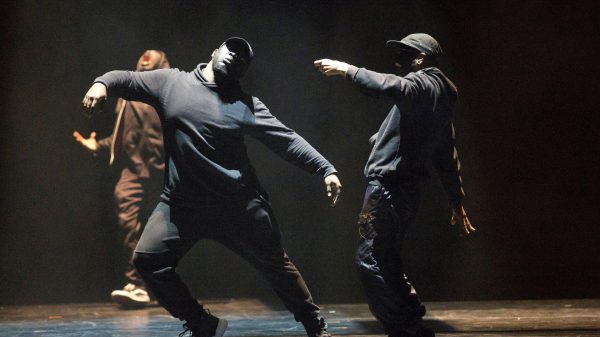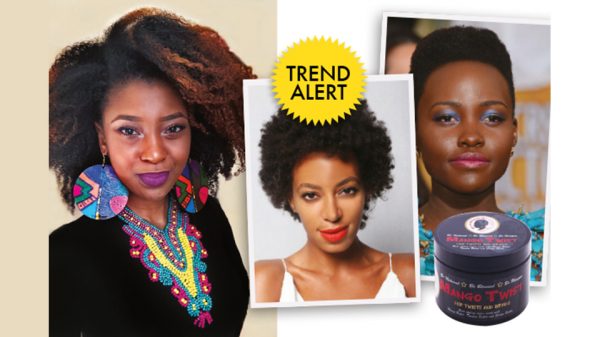Blogger and creator of online viral movement #SAGGYBOOBSMATTER Chidera Eggerue, also known as The Slumflower, has amassed a loyal following through her passionate statements on body image, female empowerment and finding strength in solitude. Nicole Vassell meets with her to find out how she does it all
Upon meeting Chidera Eggerue, I was quickly reminded of why she is so impossible to ignore. Rocking up in a pink summer dress, an icy blonde wig and some point-toed slingback shoes with a low heel, she was dressed as bold and brightly as her online persona portrays her to be – and I was immediately re-energised by her presence.
‘I love your kitten heels,’ I complimented her as we greeted. ‘People give them such a bad rap, and say that they’re embarrassing, but that’s so unfair!’
‘Oh, I don’t care what anyone thinks,’ she said back, without missing a beat. ‘Criticising kitten heels was something made up by men to embarrass women for feeling comfortable.’ Her brand of resisting expectations goes far beyond her internet, clearly.
If you haven’t heard of her by now, Chidera, who otherwise goes by her blog persona, The Slumflower, is best known for being an online influencer with an anti-misogynist, women and femme-positive message, using her social media accounts to warn people away from problematic relationship patterns and inspiring her 100k followers (and counting) to love themselves as they are.
In fact, back in September 2017, she was named as Pride’s ‘Celeb BFF’ for the month – someone exciting and inspiring to take note of. And since that time, her profile has only grown, with speaking opportunities, appearances on media influencer lists and national broadcast chats filling her calendar. One of her biggest feats in 2018 is being behind the popular hashtag #SAGGYBOOBSMATTER: an invention stemming from her pride in having non-perky breasts, and not being afraid to wear clothes that show it off.
But with having a big voice, comes big responsibility – and sometimes, a big backlash. At time of writing, Eggerue had taken a breather from Twitter, after a post stating that men should be ‘eradicated’ to ensure the safety of all women invited much criticism – so goes the life of an online activist.
With all this impact she has on the web, it was only a matter of time before her most progressive thoughts and radical chapters of advice was put into printed form – and later this month, Eggerue will celebrate the release of her debut book, What A Time To Be Alone. Written over the course of two years, the self-help title is laced with Igbo proverbs (courtesy of Mum) and original artworks, assembled to help those in need of life guidance to make the most of what they have.
Impactful, expressive and divisive for all the right reasons, Chidera is a brilliant example of a young black woman building a platform for herself – and she’s on the way up, whether the naysayers like it or not. Pride spoke to her about her new literary venture, the daily stresses of being a popular internet figure and how she deals with backlash.
Congratulations on the book, Chidera – it’s a long time coming! Let’s talk about the title: what was the motivation behind the name, What A Time To Be Alone?
Chidera Eggerue: To start, I wanted to play on the Drake & Future song ‘What A Time To Be Alive’ – it’s a funny phrase that makes you consider how crazy and chaotic life can be. It can also be a positive, like: ‘Oh my gosh, what a time to really be here!’ What A Time To Be Alone makes you focus on what it means to really be in your solitude; I really want to encourage people to find the value in their own company, through being able to ask themselves the really important questions. This book isn’t here to fix your life; it’s here to help you take control of your life.
Who did you write it for?
Chidera: It’s for someone who is a recovering overthinker ‒ like myself. Regardless of your age, if you’re someone who finds themselves in an endless, agonising spiral of layered thoughts, ‘why did that happen? How did I get myself here?’ This book will allow you to separate it all, and find clarity.
There are people who will go their whole lives not being able to be so in tune with their feelings – I’m interested in how you got to a place of emotional intelligence, yourself?
Chidera: For me, it was a lot of disappointment. Around two years ago, I was very angsty and frustrated. I was very irritated by everything and I couldn’t understand why I was finding myself in these repetitive and dark places that I swore I wouldn’t get myself into again, after learning the hard way. But life, mistakes and failure happens, you can’t help it; it’s how you respond to these scenarios that matters. I wanted to break that cycle, and the only way to do that is to start again from scratch, and to be very intentional. With every move you make, you have to ask yourself, ‘Why? What do I aim to achieve by doing this? Who is harmed by this decision?’ Through me choosing to be more intentional, I was able to identify the problems in my own behaviour; and once you’re able to see the patterns, you’re able to change.
You’ve gained a lot of fans through your #SAGGYBOOBSMATTER movement – it’s gained a lot of traction, and people are really taking it to heart! Did you expect it to take off in this way?
Chidera: The funny thing is, I never expected as many people to be involved in the conversation as there are – it’s literally been mentioned in features all around the world. But whether it got picked up or not, I’d still be talking about it. The most heart-warming messages I’ve seen have been from women in their 40s, who tell me that this is the first time they’ve been able to actually feel beautiful about their boobs.
For me, that’s such a big deal, because it’s a shame that women are feeling the need to hide ‒ men don’t necessarily have to do that. You see men walking the streets with fat beer bellies, and they don’t get shamed! But with women, we’re policed from the day that we’re born. We’re taught that we have to meet everyone else’s standards but our own. So this movement aims to allow women to really feel in control of their bodies, and how they view and speak to themselves.
The Slumflower on life lessons: ‘Nothing anyone ever does is ultimately because of you’
When women, especially young black ones, are vocal about something that many people aren’t, there’s bound to be backlash. You’ve received your fair share of harsh critique, but you face it head on ‒ how?
Chidera: With any kind of new concept, idea, or way of thinking, it’ll always be met with cynicism, because most people aren’t willing to try to understand it. They’d rather intellectualise their own reason for being so resistant to it. For me, it’s not my problem how someone chooses to respond to me; I choose to focus on the fact that the movement has inspired so many women, and they are my priority. If the people that I’m doing it for are thankful for it, that’s really all that matters to me.
For as long as you’ve been an online presence, you’ve never had any hesitation to tell people to leave their toxic boyfriends. What makes a good partner in your eyes?
Chidera: I’d say a good partner is someone who makes the choice to make room for you ‒ the key word there is ‘choice’, because I do think love is a choice. It’s not something that you’re blindly dragged into; you’re choosing that person every single day, amongst all the things about them that aren’t the greatest, you’re still making the choice to take the risk on that person.
‘I can’t fix everybody – I’m still struggling to even keep my own head above water’
You must have so many people contacting you all the time, and you seem to constantly be engaging in social media. How do you switch off? When do you stop?
Chidera: I draw the line when I receive messages from people that contain a lot of trauma. I keep an eye on what the general consensus is in my inbox, but I try not to put myself in the position of digging through my trauma in order to solve someone else’s. I have to protect myself: because if I don’t, I will literally lose my mind! It’s all about choice. I don’t feel like a bad person for not being able to fix someone’s life. I won’t put myself with this responsibility to save everybody. I can’t do that – I’m still struggling to even keep my own head above water, let alone trying to carry every single person with me.
Speaking of drawing lines, then, how do you make the distinction between the private ‘Chidera’ and the public ‘The Slumflower’?
Chidera: I choose not to share things that are super personal online. I’m very protective of my best friends, or people that I’m in relationships with – you wouldn’t even know what they look like. As much as the internet is a great place to show off the people that you love, everyone has the right to be in control of how much they share. Also, I’m trying to save as much of myself, for myself; I feel that the more of yourself you put out there, the greater the risk of allowing other people to tell you who you are.
And finally, if you could narrow it down to one: what’s been your greatest life lesson?
Chidera: Hmm… I’d say, it’s that nothing anybody ever does is ultimately because of you. Someone can be really nice to you, and as much as they’re nice because they want to be, part of it is because they want to feel good about themselves. Someone can be really horrible, but the darkness coming out of them is probably coming from something deeper. When the overthinking starts to creep in, I remind myself: You’re not the biggest problem in someone’s life! And, it works – it’s the reason why I try not to take things as personally as I used to.
What A Time To Be Alone will be published on 26 July by Quadrille, £12.99. Follow Chidera on social media: @theslumflower



































































